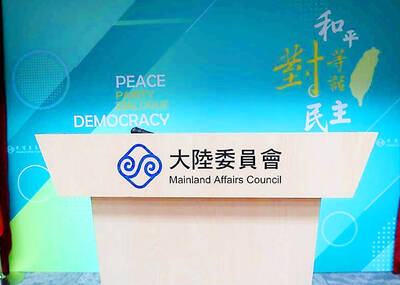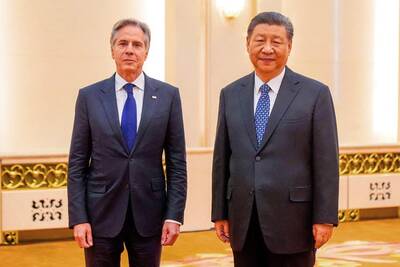Taiwan should increase efforts to foster creativity and boost the nation’s soft power in the face of China’s rapid development in the arts sphere, Minister of Culture Lung Ying-tai (龍應台) said yesterday, urging the government to recognize China’s strength in this regard amid a recent frenzy over a Chinese TV show.
The show, I Am A Singer (我是歌手), is a Hunan TV contest featuring professional singers including well-known Taiwanese artists, such as Terry Lin (林志炫) and Aska Yang (楊宗緯).
It has become one of the most talked-about TV shows in China and created a media frenzy in Taiwan as Lin, Yang and several other Taiwanese singers boosted their popularity after appearing on the show.
Several TV stations in Taiwan replaced news and political talk shows on Friday night with a live broadcast of the show’s first season finale, prompting debate over whether the show was getting too much airtime in Taiwan.
In response to media questions about I Am A Singer’s popularity, Lung said that while it demonstrated China’s huge investment in pop culture shows and show business talent, it also reflected the strength of Taiwanese singers in terms of performance and songwriting skills.
“Many Chinese singers picked songs written by Taiwanese songwriters, so the show tells us that Taiwan is ahead of China and the Chinese community in culture and creativity,” she said on the sidelines of an event to celebrate the 10th anniversary of the Taipei Story House.
“What we should be concerned about is whether we will still be the best in 30 years,” Lung said.
She said the ministry will reinforce its efforts to create a better environment for local artists, and help local singers and musicians to shine on the international stage.
She also said the signing of a cross-strait agreement on intellectual property rights cooperation and protection during the fifth round of negotiations on the cross-strait Economic Cooperation Framework Agreement (ECFA) is crucial because the fruit of local artists’ creativity should be protected, and the ministry will work with artists to increase the economic value of their intellectual property.
“We cannot compete with China in terms of capital investment. We should think about how to maintain our competitiveness via other policies,” she said.
The National Communications Commission, for example, relaxed regulations on placement marketing last year to allow product placement and the sponsorship of TV programs, except for news and children’s shows.
The commission expected the measure to stimulate investment in local productions and market Taiwan’s TV content both domestically and overseas. Lung said the government should assess the limitation and relaxation of product placement policies so that local TV programs can improve their content.
As for local TV stations’ saturation coverage of I Am A Singer, Lung said the issue should be addressed by the commission, the authority responsible for managing television stations.

NO RECIPROCITY: Taipei has called for cross-strait group travel to resume fully, but Beijing is only allowing people from its Fujian Province to travel to Matsu, the MAC said The Mainland Affairs Council (MAC) yesterday criticized an announcement by the Chinese Ministry of Culture and Tourism that it would lift a travel ban to Taiwan only for residents of China’s Fujian Province, saying that the policy does not meet the principles of reciprocity and openness. Chinese Deputy Minister of Culture and Tourism Rao Quan (饒權) yesterday morning told a delegation of Chinese Nationalist Party (KMT) lawmakers in a meeting in Beijing that the ministry would first allow Fujian residents to visit Lienchiang County (Matsu), adding that they would be able to travel to Taiwan proper directly once express ferry

STUMPED: KMT and TPP lawmakers approved a resolution to suspend the rate hike, which the government said was unavoidable in view of rising global energy costs The Ministry of Economic Affairs yesterday said it has a mandate to raise electricity prices as planned after the legislature passed a non-binding resolution along partisan lines to freeze rates. Chinese Nationalist Party (KMT) lawmakers proposed the resolution to suspend the price hike, which passed by a 59-50 vote. The Taiwan People’s Party (TPP) voted with the KMT. Legislative Speaker Han Kuo-yu (韓國瑜) of the KMT said the resolution is a mandate for the “immediate suspension of electricity price hikes” and for the Executive Yuan to review its energy policy and propose supplementary measures. A government-organized electricity price evaluation board in March

FAST RELEASE: The council lauded the developer for completing model testing in only four days and releasing a commercial version for use by academia and industry The National Science and Technology Council (NSTC) yesterday released the latest artificial intelligence (AI) language model in traditional Chinese embedded with Taiwanese cultural values. The council launched the Trustworthy AI Dialogue Engine (TAIDE) program in April last year to develop and train traditional Chinese-language models based on LLaMA, the open-source AI language model released by Meta. The program aims to tackle the information bias that is often present in international large-scale language models and take Taiwanese culture and values into consideration, it said. Llama 3-TAIDE-LX-8B-Chat-Alpha1, released yesterday, is the latest large language model in traditional Chinese. It was trained based on Meta’s Llama-3-8B

MANAGING DIFFERENCES: In a meeting days after the US president signed a massive foreign aid bill, Antony Blinken raised concerns with the Chinese president about Taiwan US Secretary of State Antony Blinken yesterday met with Chinese President Xi Jinping (習近平) and senior Chinese officials, stressing the importance of “responsibly managing” the differences between the US and China as the two sides butt heads over a number of contentious bilateral, regional and global issues, including Taiwan and the South China Sea. Talks between the two sides have increased over the past few months, even as differences have grown. Blinken said he raised concerns with Xi about Taiwan and the South China Sea, along with China’s support for Russia and its invasion of Ukraine, as well as other issues